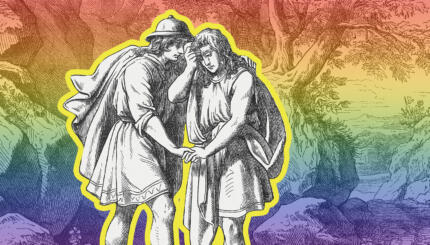Commentary on Parashat Shemot, Exodus 1:1-6:1
Moses names his first born son Gershom, still a common Hebrew name. The child is born to him and his wife Zipporah in the land of Midian, to which he fled after he murdered an Egyptian taskmaster. We do not hear of Gershom again in the epic, yet his name bears on the destiny of his father and his people. The name consists of two Hebrew words, “ger sham,“meaning “a stranger there.” By bestowing it on his son, Moses stresses the complexity of his own fate: “I have been a stranger in a foreign land” (Exodus 2:22).
Not Living With Your Own
On the surface, the name conveys the discomforting fact that Moses the Egyptian found himself living among a people not his own. From a prince in Pharaoh’s court, Moses plummeted to the lowly rank of a shepherd in the household of a Midian priest, reason enough to be disoriented. Yet his explanation of the name is not in the present tense but in reference to his past. Even in Egypt, in the royal palace, he felt not wholly at home. His Hebrew wet nurse, his mother, must have imbued him with an inchoate and subliminal sense of Hebrew identity. What else could have prompted him to investigate for himself the lot of Egypt’s downtrodden Israelites or to side with them instantaneously? His compassion erupted from a shared wellspring of memories. So his son’s name pointed to the deeper unease of being a Hebrew in Egypt.
It also adumbrated the fate of Jews in exile. Gershom Soncino was the most productive and famous member of an illustrious family of early Italian Jewish printers. In 1483-84, his uncle, Joshua Solomon Soncino had printed for the first time ever in Soncino in the Duchy of Milan, two tractates of the Babylonian Talmud. In the last decade of the 15th century and the first few of the 16th century, Gershom published a torrent of Hebrew books, including at least another 25 tractates of the Talmud, in eight different Italian cities as well as in Salonika and Constantinople. An era drenched in turmoil kept him on the move. Often in the colophon to his books, he would underscore the meaning of his name, ger sham, a mere sojourner in whatever principality gave him entry. His permanent residence was in the world of Torah, which he strove to make more accessible through the invention of printing.
In Egypt, Jacob’s progeny were known as Hebrews. The narrative tells us that Pharaoh ordered the Hebrew midwives to kill any male child of a Hebrew woman (1:15-16). When confronted for disregarding the order, they claimed that “the Hebrew women are not like the Egyptian women: they are more vigorous. Before the midwife can come to them, they have given birth” (1:18-19).

Help us keep Jewish knowledge accessible to millions of people around the world.
Your donation to My Jewish Learning fuels endless journeys of Jewish discovery. With your help, My Jewish Learning can continue to provide nonstop opportunities for learning, connection and growth.
A midrash deepens the significance of the name. To be sure, it derives from the word eiver, meaning beyond or other side as in Joshua’s swan song: “In olden times, your forefathers…lived beyond the Euphrates…(be-eiver ha-nahar) and worshipped other gods. But I took your father Abraham from beyond the Euphrates ” (Joshua 24:2-3). The Midrash, however, turns geography into history. The role of Israel is to be the eternal dissenter, the uncompromising critic of cultures addicted to the senses. The name ivri destines us to stand apart, “when all the world [stands] on one side (me-eiver ehad,), he [must stand] on the other” (Bereshit Rabba, 42:8). To fulfill its mission as a beacon, Israel needs to keep its distance.
And this is what the Passover Haggadah insists the Hebrews managed to do in Egypt. They remained distinctive and readily identifiable. Neither exile nor oppression diluted their way of life. As Don Isaac Abravanel, the statesman of Spanish Jewry in the hour of its grim demise, wrote in his commentary on this passage: “They did not change their names nor their faith nor their language…Moreover, they congregated together in one place rather than disperse in different cities and thus they appeared as a singular nation.”
Were They Assimilated?
In other words, even though both Jacob and Joseph were embalmed, tradition would have us believe that our ancestors in Egypt were able to withstand the allurement of assimilation. Perhaps it was hostility that reinforced their identity.
This was not the case in the wake of Alexander’s conquest of the Near East in 333 B.C.E. Some 150 years later we hear of Jews in Palestine, in an era free of persecution, ready to remake Judaism according to the dictates of Hellenistic civilization. We read in First Maccabees: “At that time there came forth from Israel certain lawless men who persuaded many saying, ‘Let us go and make a treaty with the heathen around us, because ever since we separated from them, many evils have come upon us'” (1:11). Led by priests, this group got permission from the Seleucids to build a gymnasium in the heart of Jerusalem, did away with circumcision and abandoned much of the Torah. In consequence, they provoked civil war. Radical change evoked a radical response. Traditionalists were not about to forego their apartness, especially in the precincts of Jerusalem.
To my mind, the names of Gershom and Ivri symbolize the existential reality of being Jewish. It takes a measure of independence from the surrounding culture to perpetuate Judaism, all the more so in a friendly society. Our survival in exile amounts to a millennial campaign for the right to be different, individually and collectively.
What a tragic irony, if having finally won recognition for that right, we would now divest ourselves of every iota of distinctiveness. We ought to remind ourselves that the sovereign self is not a Jewish ideal and that diversity without continuity is but another name for anarchy. That which bears the residue of the ages enhances our sense of the holy and facilitates our quest for transcendence.



